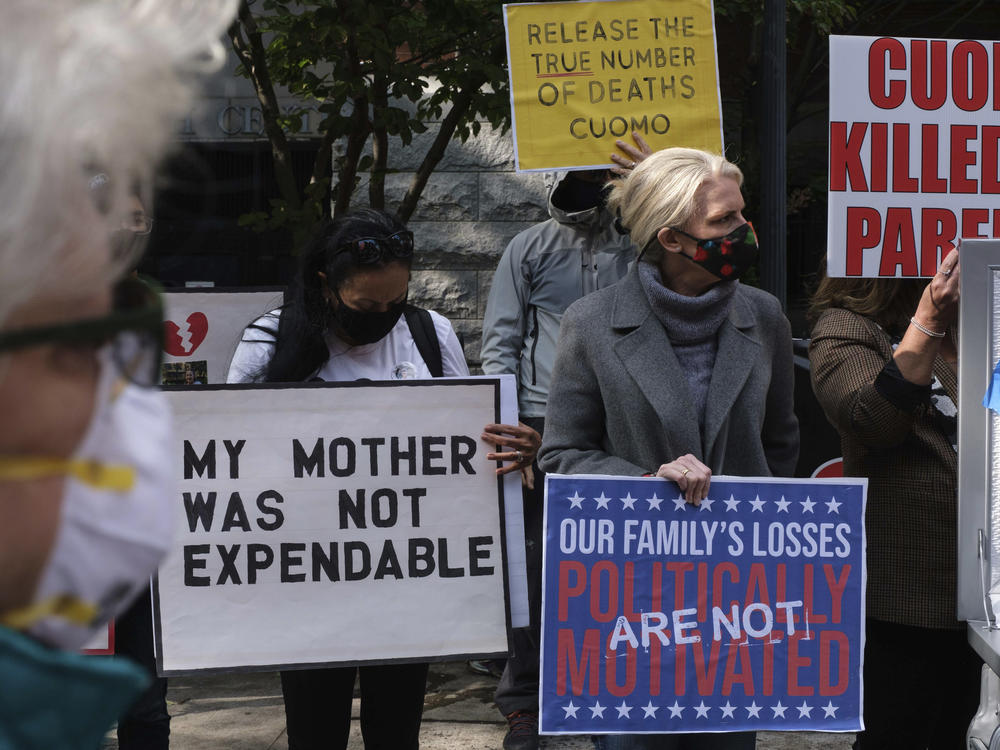Section Branding
Header Content
Investigation: Cuomo Team Undercounted N.Y. COVID-19 Nursing Home Deaths
Primary Content
When the first coronavirus wave hit New York state last spring, nursing homes and assisted living facilities were devastated.
An investigation by the office of state Attorney General Letitia James issued Thursday found the death toll was far worse than officials disclosed.
"A larger number of nursing home residents died from COVID-19 than [New York Department of Health] data reflected," the preliminary report concluded.
N.Y. officials had estimated nursing home deaths during the pandemic totaled roughly 8,700.
But the probe by James' office found those reports "undercounted by as much as 50%" the number of seniors who died.
Investigators surveyed more than 60 nursing homes and found discrepancies between the number of deaths recorded and numbers previously reported by state officials.
The AG's office says it is still "investigating those circumstances where the discrepancies cannot reasonably be accounted for," according to a statement in the report.
Cuomo himself hasn't responded to the report. But state Health Commissioner Dr. Howard Zucker issued a lengthy statement Thursday afternoon downplaying the significance of the findings.
Zucker said N.Y. reported coronavirus fatalities by the location where they occurred. Which means if an elderly patient died after being transported to a hospital, they wouldn't be included in the tally of nursing home deaths.
"DOH does not disagree that the number of people transferred from a nursing home to a hospital is an important data point, and is in the midst of auditing this data from nursing homes," Zucker added.
During the pandemic, Cuomo, a Democrat, gained a national profile for his hands-on approach to promoting public health policies and reducing infection rates.
For a time, his daily briefings drew a national audience, serving as a kind of counterpoint to coronavirus briefings held by then-President Donald Trump.
But questions about Cuomo's handling of nursing home safety have haunted his administration.
Cuomo has drawn particular fire for an executive order issued in March requiring nursing homes to re-admit residents still recovering from COVID-19.
His administration later rescinded the controversial order.
Last summer, a report by state health officials concluded high rates of coronavirus death in nursing homes were caused by infected staff, not returning residents.
But Cuomo's team has refused to make public the data used to compile that report.
Earlier this week, a top Democrat in the state legislature, Sen. James Skoufis, threatened to file subpoenas to "compel" Health Department officials to release more information.
This new report adds to the pressure on Cuomo's team to offer a full accounting of nursing home mortality.
In a statement, James, also a Democrat, said "it is imperative that we understand why the residents of nursing homes in New York unnecessarily suffered at such an alarming rate."
While much of the scrutiny of Cuomo's nursing home policy has come from fellow Democrats and the media, the issue has increasingly become a political liability for the governor.
Shortly after James' report was made public, New York's Republican Party issued a statement condemning Cuomo's handling of the pandemic and accusing him of a "cover-up."
"These findings will have implications across New York state and they cannot be dismissed as political attacks," the statement read.
James' report also found many nursing homes in New York failed to comply with infection control protocols and lacked sufficient personal protective equipment needed to keep residents safe.
Copyright 2021 NPR. To see more, visit https://www.npr.org.

